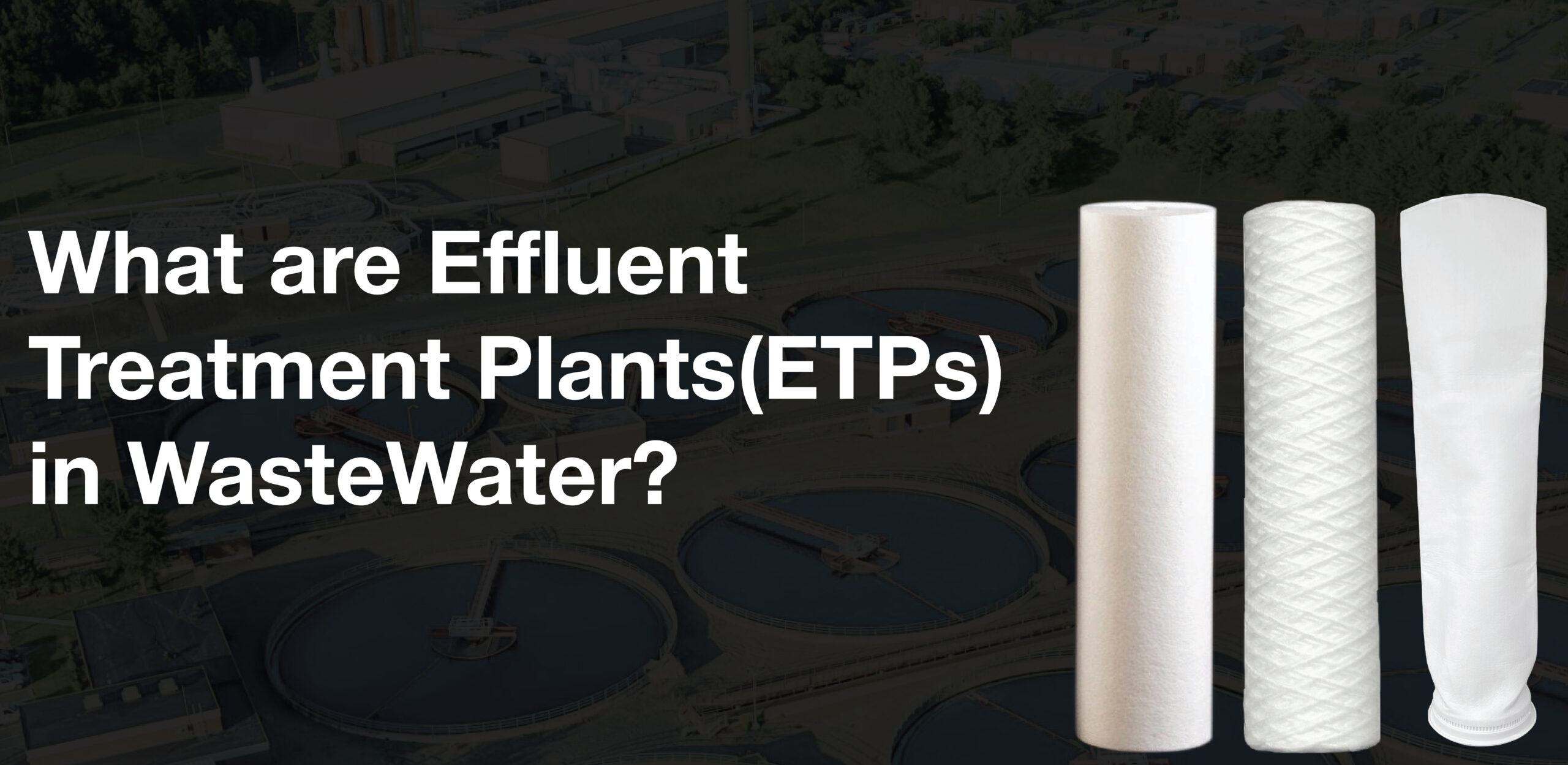What are Effluent treatment plants (ETPs) in WasteWater?

Industries that generate some amount of water-wastage are required to treat it before releasing it back in rivers or reuse it, for treating water ETP setup’s/plants are used to treat and ensure the safe discharge of treated water in compliance with environmental standards. In such plants, Total Suspended Solids (TSS) is a major contaminant that must be removed to protect downstream equipment such as RO’s that are used to ensure the overall treatment process. This article will focus on the function of Depth filters in removing TSS, their role in preventing biofouling, and how Gopani’s string wound filters can help extend filter life of ETP processes. What is (ETP) Effluent treatment plant?
It use filtration and separation method to remove contaminants from wastewater. There are two types of contaminants, dissolved and suspended. This type of filtration helps remove harmful contaminants and is important in keeping hazardous waste out of the environment and minimizing pollution.
How ETPs work?
A brief overview of how Effluent Treatment Plants (ETPs) operate:
Screening: This is the first treatment step for sewage systems in which large-sized materials like rags, sticks, and plastics are eliminated to protect equipment and permit smooth flow in the later stages of the sewage system.
Main Treatment: Wastewater enters sedimentation tanks in which solids settle out, while floating materials are skimmed off, reducing suspended solids by a large amount.
Secondary Treatment: Organic pollutants are degraded through biological processes. In aeration, microorganisms degrade these pollutants followed by settling tanks for separating the sludge from the treated water.
Tertiary Treatment: Advanced processes of filtration such as chemical coagulation, and disinfection allow the removal of fine particles, nutrients, and remaining contaminants. This process achieves treatment waters that comply with environmental performance standards. Our string-wound filters are particularly suitable for treating fine particles and ultimately increase the overall efficiency of the treatment process.
Sludge Treatment: The solids produced by the treatment process undergo additional treatment before they can be safely disposed of or recycled.
Disinfection: Ensure destruction of pathogens so that treated water is safe for discharge or reuse.
Definition of Total Suspended Solids (TSS) and Role of String Wound Totally Suspended Solids or TSS denote solid particles that remain suspended and do not dissolve completely in water. Examples of solids include:
- Sand
- Silt
- Organic matter
- Debris
TSS can do great harm to purification systems by blocking and wearing out parts and, thus, lowering system efficiency. Hence, the removal of TSS becomes imperative in effluent treatment for protection against sensitive downstream processes-entailing Reverse Osmosis (RO).
String wound filters, being widely used in the pre-treatment stages of ETPs, stand good chances in efficiently removing TSS. However, they do not include the direct removal of biological impurities like bacteria or algae. They do play an important role in preventing the surface clogging and premature failure of other filters resulting from biofouling, a common problem in water treatment systems.
String Wound Filters-A Way for TSS Removal
String wound filters are depth filters where yarn or string is wound around a core in a prescribed manner. These filters remove TSS from water by trapping solid particles in various layers of the filter. The salient features of string wound filters are:
- High Dirt-holding Capacity: Because depth filtration captures a relatively large amount of total suspended solids, the pull-down of filter replacements is less frequent.
- Gradient Density: The outer layers allow larger particulate matter to pass through and are thus less dense, while the inner layers restrict finer particles.
- Mechanical Strength: The unique design can handle high flow rates and pressure and is therefore well-suited for pre-treatment applications in ETPs.
However, it is important to point out that string-wound filters are not really designed to actually remove the biological impurities like bacteria or algae themselves. Their main purpose is to remove TSS, which will help reduce clogging in downstream equipment.
Limitations of String Wound Filters in High Biofouling Conditions
String wound filters, even if effective, are quite susceptible to biofouling. High content of biological impurities in the water can lead to the formation of a biofilm on the filter surface which can lead to one of the following:
- Pre-mature Clogging: Biofouling can cause clogging of the string-wound filter by blocking the pipe through which liquid flows from one end to The other. This is very likely to worsen the filter’s TSS-removing capabilities, implying that the filter must be changed very frequently.
- Reduced Filter Life: If this fouling begins at the filter surface, then the working life is reduced drastically.
- To overcome these issues, biocides are often added to water to control biological growth, thus reducing the biofilm developed on the filters.
Why Choose Gopani for Your Filtration Needs?
Gopani provides advanced string-wound filters that solve such challenges by removing TSS and minimizing biofouling for improved system performance and longer service life of filters. The company offers an entirely customized filter specific to an industry requirement, thus ensuring high-level efficacy with cost-effectiveness.
Limitations of String Wound Filters in High Biofouling Conditions
Despite their benefits, string wound filters are not immune to bio-fouling. In cases where the water contains high levels of biological impurities, biofilms can form on the surface of the string wound filter itself, leading to:
- Premature Clogging: Biofilms can block the surface of the string wound filter, reducing its effectiveness in removing TSS and leading to more frequent filter replacements.
- Reduced Filter Life: If bio-fouling occurs on the string wound filter, its operational life can be significantly shortened, increasing maintenance costs.
To reduce these issues, biocides are often added to the water to control biological growth. Biocides help reduce the formation of biofilms on filters, extending the life of both string wound filters and downstream filtration systems.
Why Choose Gopani for Your Filtration Needs?
Gopani provides high-quality filtration solutions with advanced string-wound filters that remove TSS and reduce biofouling, improving system performance and filter life. We offer customized filters designed to meet the specific needs of your industry, ensuring better efficiency and cost savings.
All of our products are ISO 9001:2015 certified and undergo thorough quality testing. Fewer changes and a longer time between cleaning mean their filters are able to hold greater dust particles, and they are truly reliable in performance and consistency. Plus, you get the backup of experienced support, fast delivery, and friendly customer service to help with all filtration needs.
Conclusion
Effluent Treatment Plants (ETPs) are loaded to the brim with a very detailed description of the whole process of industrial waste water management with special emphasis on safety for the environment as well as humans. Gopani’s string wound filters help sharpen these treatment processes by removing Total Suspended Solids (TSS) and preventing biofouling. Using the latest technology provides these customized solutions and a commitment to sustainability that positions Gopani as a reliable and economical solution for all your effluent treatment requirements.
Gopani Product Systems
Putting Innovation in Filtration Since 1993
Who we are?
- ISO 9001:2015 Certified
- Quality Conscious
- Forward Thinking and People Positive
- Engineers and Innovators at Work
Resources
- What is Filter Cartridge?
- What is a String Wound Cartridge Filter?
- What is Melt Blown Filter Cartridge?
- What is a Pleated Cartridge Filter?
- Filtration and Separation
- Why Advanced Pre-filtration for Desalination?
- Advanced Filtration Solutions For Oil And Gas Industry
- Advanced Filtration Solutions For Chemicals & Solvents
- Advanced Filtration Solutions For Pharmaceuticals
- Process and Utilities Water Treatment
Our Trending Cartridge Filters Products
- Melt Blown Cartridge Filters
- String Wound Cartridge Filters
- Pleated Cartridge Filters
- ClaryFlow Big Buddy
- High Flow Filter Cartridges and Housings





